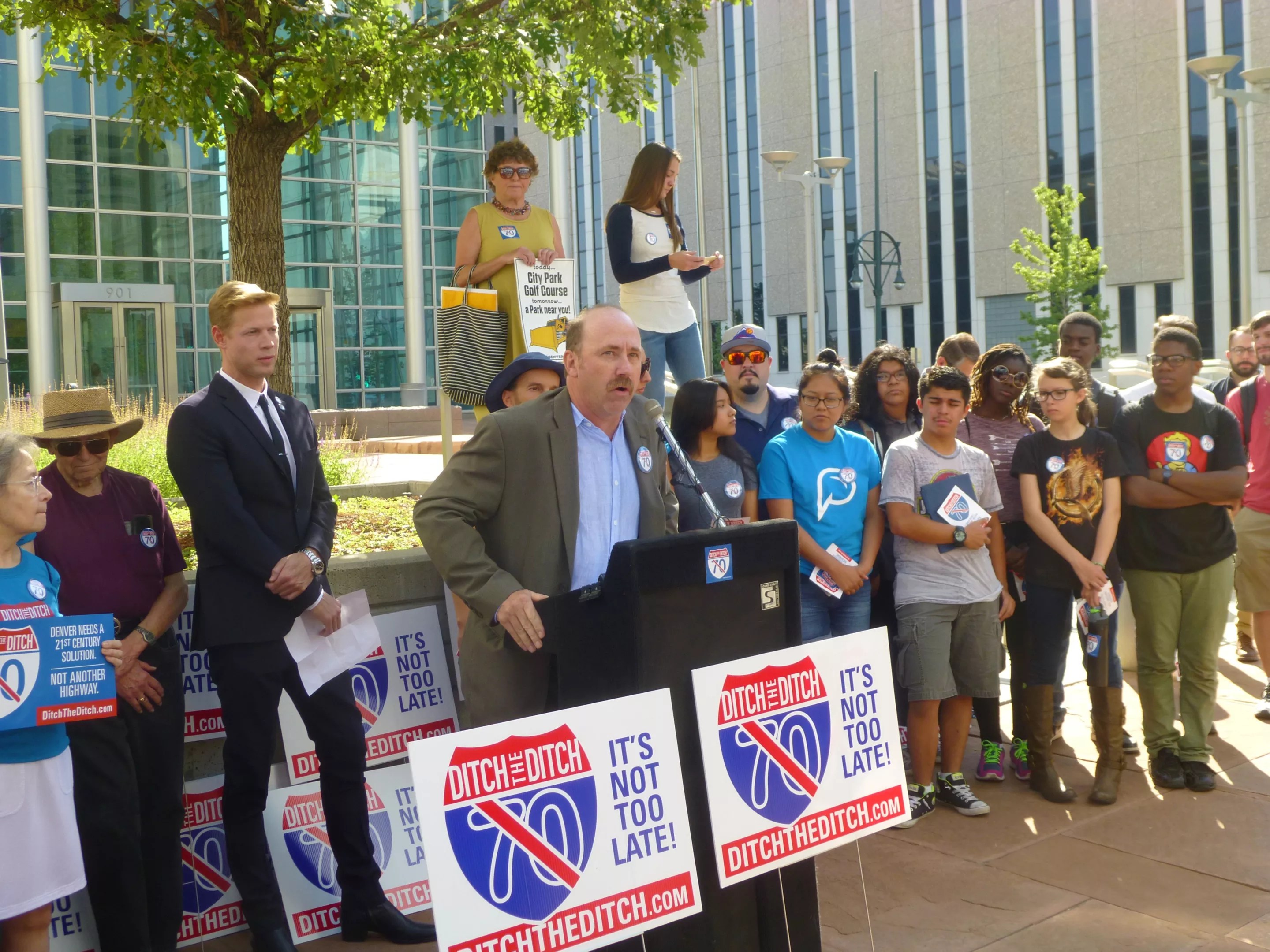
Alan Prendergast

Audio By Carbonatix
The Colorado Department of Transportation’s plans for a $1.8 billion expansion of I-70 through northeast Denver, along with a related stormwater project pushed by city officials, are facing yet another legal challenge. The latest action, backed by an alliance of local residents, environmental activists, and a prominent RiNo developer, claims that the federal government shirked its obligations to fully consider a range of economic and environmental impacts before approving the highway upgrade, the biggest road project in the state’s history.
“This is a boondoggle,” plaintiff Brad Evans announced at a press conference outside the federal courthouse today, July 10. “We’re after transparency. We’re after justice…we’re not laying down on this. We’re going to fight this in every possible way.”
The expansion focuses on a congested stretch of I-70 between I-25 and Chambers Road. It would replace a crumbling six-lane viaduct with a below-grade, partially covered superhighway expanded to ten lanes; officials say that a four-acre “lid” of greenery on top of the highway as it moves through the Elyria and Swansea neighborhoods would help reunite communities that were disrupted by the viaduct construction in the 1960s. But opponents maintain that the project will only create further disruption and environmental hazards in what is already one of the city’s poorest areas (and reputedly the most polluted zip code in the country).
Two other lawsuits are currently pending in response to the plan. More than a year ago, the Sierra Club joined with community groups in the affected neighborhoods to file a federal lawsuit against the EPA, claiming that the agency lowered its pollution standards in order to greenlight the construction. Last summer, defenders of City Park Golf Course launched another lawsuit in Denver District Court, contesting the city’s right to mow down hundreds of trees and create a “detention area” for stormwater runoff on the golf course, as part of its $300 million stormwater diversion plan – a plan that critics insist is being pursued primarily to benefit the highway project. CDOT is helping to pay for the stormwater upgrade through an intergovernmental agreement.
City and state officials have long insisted that the stormwater and highway projects are needed infrastructure improvements that are each being developed on their own merits – despite a long paper trail that indicates considerable discussion and collaborative planning. The latest lawsuit claims that the two projects are, in fact, joined at the hip, and that the Federal Highway Administration should have taken into account the environmental impacts of the stormwater project (which involves construction through the contaminated soils of Superfund sites) in its review of the project under the National Environmental Policy Act (NEPA). A central contention of the suit is that CDOT and the City of Denver worked so hard to portray the two projects as unrelated so that CDOT could avoid including the drainage project impacts in its NEPA review.
One 2014 city document cited in the complaint notes that for CDOT to amend its environmental impact statement to include the drainage project “is such a large change in scope that they would have to start their NEPA EIS process essentially over again. It has taken them two years to get to the point k they are ready to submit their supplemental package, and they are unwilling to jeopardize their progress on the EIS for the I-70 [expansion].”
The lawsuit is being funded by donations to Ditch the Ditch and by the Zeppelin family, developers of several properties in the River North district. Lead plaintiff Kyle Zeppelin decried the “egregious social, economic and environmental toll” of the highway project and called on officials to take a closer look at alternatives, including routing major truck traffic further north via I-270 and I-76.
CDOT officials have insisted that the project has gone through years of thorough regulatory review. At a community meeting in Swansea last February, CDOT executive director Shailen Bhatt said the highway reconstruction would move forward without a court order. Opponents described his position as a “So sue me” stance and indicated they would do just that.
In a written statement released in response to the lawsuit, CDOT project director Anthony DeVito said, “CDOT is confident that our unprecedented community-outreach process and our thorough technical analysis meet and exceed the standards set by the National Environmental Policy Act. We believe this process, our analysis, and this project will stand up under the toughest legal scrutiny.”